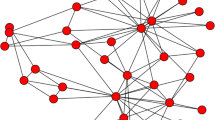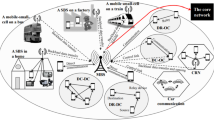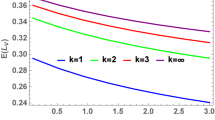Abstract
We compare the performance of three usual allocations, namely max-min fairness, proportional fairness and balanced fairness, in a communication network whose resources are shared by a random number of data flows. The model consists of a network of processor-sharing queues. The vector of service rates, which is constrained by some compact, convex capacity set representing the network resources, is a function of the number of customers in each queue. This function determines the way network resources are allocated. We show that this model is representative of a rich class of wired and wireless networks. We give in this general framework the stability condition of max-min fairness, proportional fairness and balanced fairness and compare their performance on a number of toy networks.
Similar content being viewed by others
References
M. Armony and N. Bambos, Queueing dynamics and maximal throughput scheduling in switched processing systems, Queueing Systems 44(3) (2003) 209–252.
N. Bambos and G. Michailidis, Queueing and scheduling in random environments, Adv. Appl. Prob. 36 (2004) 293–317.
S. Ben Fredj, T. Bonald, A. Proutière, G. Régnié, and J.W. Roberts, Statistical bandwidth sharing: A study of congestion at flow level, in: Proc of ACM SIGCOMM (2001).
A.W. Berger, Y. Kogan, Dimensioning bandwidth for elastic traffic in high-speed data networks, IEEE/ACM Trans. on Networking 8(5) (2000) 643–654.
D. Bertsekas and R. Gallager, Data Networks (Prentice Hall, 1987).
T. Bonald, M. Jonckheere, and A. Proutière, Insensitive load balancing, in: Proc. of ACM SIGMETRICS/Performance (2004).
T. Bonald and L. Massoulié, Impact of fairness on Internet performance, in: Proc. of ACM SIGMETRICS/Performance (2001).
T. Bonald and A. Proutière, Insensitive bandwidth sharing in data networks, Queueing Systems 44(1) (2003) 69–100.
T. Bonald and A. Proutière, On performance bounds for balanced fairness, Performance Evaluation 55 (2004) 25–50.
T. Bonald and A. Proutière, On performance bounds for the integration of elastic and adaptive streaming flows, in: Proc. of ACM SIGMETRICS/Performance (2004).
T. Bonald, A. Proutière, J. Roberts, and J. Virtamo, Computational aspects of balanced fairness, in: Proc. of ITC 18 (2003).
T. Bonald and J. Virtamo, Calculating the flow level performance of balanced fairness in tree networks, Performance Evaluation 58 (2004) 1–14.
T. Bonald and J. Virtamo, A recursive formula for multirate systems with elastic traffic, IEEE Communications Letters 9 (2005) 753–755.
J. Boyer, F. Guillemin, P. Robert, and B. Zwart, Heavy tailed M/G/1-PS queues with impatience and admission control in packet networks, in: Proc. of Infocom (2003).
P. Brémaud, Markov Chains: Gibbs Fields, Monte Carlo Simulation, and Queues (Springer, New York, 1999).
T.M. Cover and J.A. Thomas, Elements of Information Theory (Wiley, 1991).
F. Delcoigne, A. Proutière, G. Régnié, Modeling integration of streaming and data traffic, Performance Evaluation 55(3/4) (2004) 185–209.
G. Fayolle, A. de la Fortelle, J.M. Lasgouttes, L. Massoulié, and J.W. Roberts, Best-effort networks: Modeling and performance analysis via large networks asymptotics, in: Proc. of IEEE INFOCOM (2001).
G. Fayolle, I. Mitrani, and R. Iasnogorodski, Sharing a processor among many job classes, Journal of the ACM 27 (1980) 519– 532.
D.P. Heyman, T.V. Lakshman, A.L. Neidhardt, A new method for analysing feedback-based protocols with applications to engineering Web traffic over the Internet, in: Proc. of ACM SIGMETRICS (1997).
D. Julian, M. Chiang, D. O'Neill, and S. Boyd, QoS and fairness constrained convex optimization of resource allocation for wireless cellular and ad hoc networks, in: Proc. of IEEE INFOCOM, (2002).
F.P. Kelly, A. Maulloo, and D. Tan, Rate control for communication networks: Shadow prices, proportional fairness and stability, Journal of the Operat. Res. Society 49 (1998) 237–252.
F.P. Kelly and R.J. Williams, Fluid model for a network operating under a fair bandwidth-sharing policy, Annals of Applied Probability 14 (2004) 1055–1083.
P. Key, L. Massoulié, A. Bain and F. Kelly, A network flow model for mixtures of file transfers and streaming traffic, in: Proc. of ITC 18 (2003).
A. Kherani and A. Kumar, Stochastic models for throughput analysis of randomly arriving elastic flows in the Internet, in: Proc. of IEEE INFOCOM (2002).
S. Kunniyur and R. Srikant, End-to-end congestion control schemes: Utility functions, random losses and ECN marks, in: Proc. of IEEE INFOCOM (2000).
J. Leino and J. Virtamo, Insensitive traffic splitting in data networks, in: Proc. of ITC 19 (2005).
X. Liu, E.K.P. Chong, and N.B. Shroff, A framework for opportunistic scheduling in wireless networks, Computer Networks 41(4) (2003) 451–474.
L. Massoulié, Structural properties of proportional fairness: Stability and insensitivity (2005) submitted.
L. Massoulié and J.W. Roberts, Arguments in favour of admission control for TCP flows, in: Proc. of ITC 16 (1999).
L. Massoulié and J.W. Roberts, Bandwidth sharing and admission control for elastic traffic, Telecommunication Systems 15 (2000) 185–201.
L. Massoulié and J.W. Roberts, Bandwidth sharing: Objectives and algorithms, IEEE/ACM Trans. on Networking 10(3) (2002) 320–328.
J. Mo and J. Walrand, Fair end-to-end window-based congestion control, IEEE/ACM Trans. on Networking 8(5) (2000) 556– 567.
T. Nandagopal, T. Kim, X. Gao, and V. Bharghavan, Achieving MAC layer fairness in wireless packet networks, in: Proc. of ACM MOBICOM (2000).
R. Nú nez Queija, J.L. van den Berg, and M.R.H. Mandjes, Performance evaluation of strategies for integration of elastic and stream traffic, in: Proc. of ITC 16 (1999).
V. Paxson and S. Floyd, Difficulties in Simulating the Internet, IEEE/ACM Trans. on Networking 9(4) (2001) 392–403.
A. Penttinen and J. Virtamo, Performance of wireless ad hoc networks under balanced fairness, in: Proc. of Networking (2004).
B. Radunovic, J.Y. Le Boudec, Rate performance objectives of multihop wireless networks, IEEE Trans. on Mobile Computing 3(4) (2004) 334–349.
J. Rawls, A Theory of Justice (Belknap Press, 1971).
J.W. Roberts, A survey on statistical bandwidth sharing, Computer Networks 45 (2004) 319–332.
R.F. Serfozo, Introduction to Stochastic Networks (Springer Verlag, 1999).
G.M. Stamatelos and V.N. Koukoulidis, Reservation-based bandwidth allocation in a radio ATM network, IEEE/ACM Trans. on Networking 5(3) (1997) 420–428.
L. Tassiulas and A. Ephremides, Stability properties of constrained queueing systems and scheduling policies for maximum throughput in multi-hop radio networks, IEEE Trans. Aut. Control 37 (1992) 1936–1938.
I.E. Telatar and R.G. Gallager, Combining queueing theory with information theory for multiaccess, IEEE Journal Selected Areas in Comm. 13 (1995) 963–969.
G. de Veciana, T.J. Lee and T. Konstantopoulos, Stability and performance analysis of networks supporting elastic services, IEEE/ACM Trans. on Networking 9(1) (2001) 2–14.
H.Q. Ye, Stability of data networks under an optimization-based bandwidth allocation, IEEE Trans. Aut. Control 48(7) (2003) 1238–1242.
Author information
Authors and Affiliations
Corresponding author
Rights and permissions
About this article
Cite this article
Bonald, T., Massoulié, L., Proutière, A. et al. A queueing analysis of max-min fairness, proportional fairness and balanced fairness. Queueing Syst 53, 65–84 (2006). https://doi.org/10.1007/s11134-006-7587-7
Issue Date:
DOI: https://doi.org/10.1007/s11134-006-7587-7




